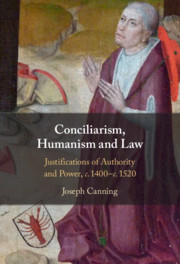3 - Italian Humanism
Published online by Cambridge University Press: 18 June 2021
Summary
This chapter discusses Italian humanism for the fifteenth and early sixteenth centuries from the point of view of ideas justifying power. It shows that these humanists were expressly concerned with the justification of power. The method they used was fundamentally different from the scholastic one employed by the conciliarists and their opponents: the humanists used rhetoric based on their knowledge of Latin and Greek works. The chapter considers republican thought at Florence (Bruni and Plamieri). Humanists also justified both republican and signorial or princely regimes: Patizi and Platina argued both ways. Arguments in favour of mixed constitutions are discussed, notably in the case of Venice with the works of Vergerio and Quirini. Many authors wrote in defence of signorial or princely regimes, notably those of Milan and Naples. Particular attention is given to the argument that, whatever the origins of the ruler's power might be, his rule is justified if he acts with virtue. Machiavelli was unusual in that he did not believe that power had to be justified. His treatment of how a prince might maintain his state and also his defence of republican liberty are discussed.
- Type
- Chapter
- Information
- Conciliarism, Humanism and LawJustifications of Authority and Power, c. 1400–c. 1520, pp. 92 - 143Publisher: Cambridge University PressPrint publication year: 2021



